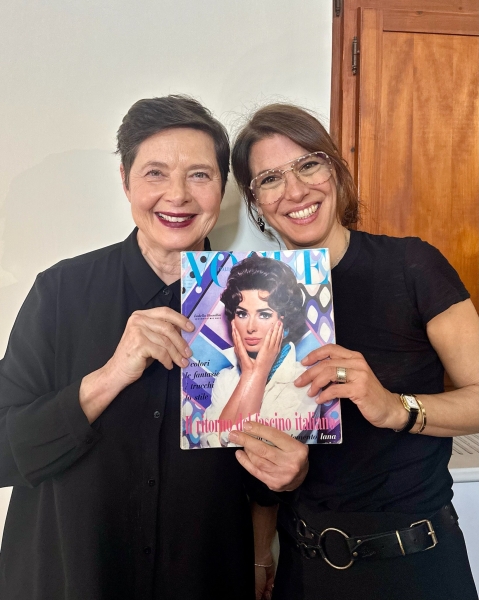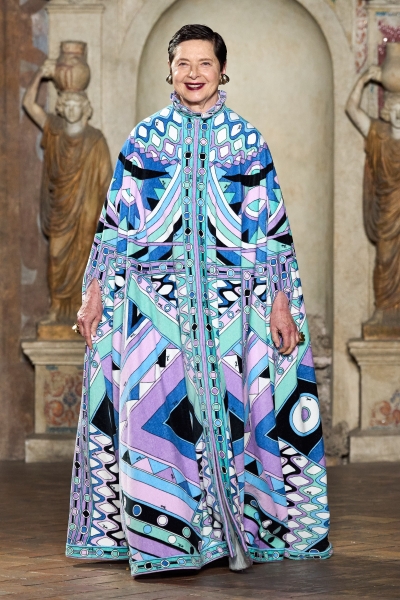
Isabella Rossellini needs no introduction. In Rome to walk the Pucci spring show, where she closed with regal grace to much applause; she was part of an age-diverse casting that also included fellow supermodels Christy Turlington and Eva Herzigova. Rossellini’s modeling and acting career has spanned decades; it took a turn for the controversial in 1993, when, after a 10-year run as the radiant face of Lancôme beauty, she was dumped at 40 because she wasn’t age-appropriate enough to represent an audience that “according to the management’s marketing research, apparently only dreamed of being young,” she explained backstage at the show. It was a decision that rightly sparked outrage, but times were still not ready for a contrite “sorry, we apologize, we made a mistake” public statement. But as the saying goes, you just have to sit on the river bank, and wait. Two decades later, the brand called her back.
In the meantime, her life has bloomed in different, intriguing directions, a testament to her belief that “creativity is ageless.” She resumed her studies and graduated in ethology, earning a master’s degree in animal behavior; opened a regenerative farm (Mama Farm) in Brookhaven, New York, where she focuses on conservation and biodiversity, raising rare breeds of chickens that make extraordinary eggs in delicate artistic colors, and mellow sheep from whose abundant woolly locks a fine cashmere yarn is produced. She also writes books, makes short movies, and tours theaters with her company, Link Link Circus. She’s living proof that energy, if fueled by nurturing passions, doesn’t attenuate with age—quite the contrary. It increases in focus and intelligent dedication.
Rossellini has always been vocal about beauty and age; I sat down with her backstage before the Pucci show to talk about how the industry has (and hasn’t) changed since her ‘90s Vogue Italia cover, shot by Meisel and styled by Carlyne Cerf de Dudzeele, where she was clad in Pucci, looking like a young, irresistible Sophia Loren.

Vogue: What do you remember of that ‘90s Vogue Italia shoot with Steven Meisel?
Isabella Rossellini: At that time I was working as a model. It was a time when Steven (Meisel) was inspired by strong, potent female figures, women of charisma like Maria Callas, or Marlene Dietrich—he liked not her stage images, rather the more intimate portraits taken by Alex Liberman, where her gestures exuded a natural appeal. Together we did lots of editorials, intended as homages to these extraordinary women, and he asked me to be part of a shoot styled by Carlyne about Pucci. Obviously I knew Pucci, because in the ’60s it had tremendous success, I was a little girl at the time but my mother (Ingrid Bergman) had a few Pucci dresses; they synced up with her style, she was Swedish and had lived in America, so she favored a sense of simple, practical elegance. Pucci was a sort of revolution in those days, it seemed unbelievable that women would dress up in Pucci pajamas in their everyday life and for parties, it was so different from the uptight, bourgeois and formal style then culturally in vogue; there was an ease that felt incredibly new. It was utterly modern. You could wear the same dress from morning to evening, you just had to add some jewelry and off you’d go to a party. That’s why my mother liked it so much, it was so chic and comfortable. I was looking at her thinking: One day I could wear it too!
So that shoot brought you back to personal memories.
Steven knew that being Italian I knew a certain culture of gestures, that expressive hand language that’s rather difficult to replicate if you’re not instinctively familiar with it. So we got inspired by big screen divas like Sophia Loren, Gina Lollobrigida, Sylva Koscina, Italian stars of the ’60s. Stunningly beautiful women, vibrant and sensual, always impeccably made-up with bouffant coiffures—they were sexy, modern, positive role models for those times. Pucci’s style had the same expressive vibe of vitality, the ease, the joie de vivre in contrast with the conservative cultural climate, and without being provocative it was kind of disruptive, it wasn’t overly sexy but conveyed freedom and an affirmative spirit.
Going back to your successful modeling career, after the mid ’90s you almost stopped working.
In 1983 I landed a beauty contract with Lancôme, which ended abruptly after 10 years in 1993. It wasn’t me who stopped working, it was the system, the beauty and fashion industry, that basically dumped me! Lancôme obviously took the flack for not renewing my contract, but even if I had wanted to continue working, no one wanted me anymore. Lancôme dumped me because the management believed that advertising is about dreams, and in their opinion women dream of being eternally young, so a 40 years old woman cannot represent that dream. So they said goodbye and thank you. Talking to my friends, I was asking them, “Do you really dream about forever being a 20-year-old girl?” And their answer was, “Absolutely not!” I don’t understand how Lancôme managed market research really… but probably it was just biased cultural ageism, a punitive culture mindset for which it seemed impossible to represent “a dream” at 40. Lancôme called me back [later] though.
It must’ve been such a sweet revenge. Do you think that the cultural landscape has changed, allowing for more diverse and open-minded choices ?
Yes, I think it has—but who knows? Here at the Pucci show I met with longtime friends Christy and Eva, and it was such a happy reunion, but we were asking ourselves: Are we here because it’s just a flash, a fad of the moment, and then we all will go back to the dominant paradigm of willowy, skinny 20-year-olds? Who knows, it’s impossible to predict, but we’re glad to be here, it feels vital and optimistic. When I look at fashion or beauty, I want to be inspired by an idea of elegance and refinement that appeals to any age, while on the pages of Vogue or other publications I only see very young women—what’s offered are garments I cannot possibly wear. Too transparent, too revealing, too risqué. So I’ve looked for inspiration to what elegant women of the past were wearing at my age—Maria Callas, Jackie Onassis, my mother. To see what influenced their choices, and how they navigated the often impossible task to dress appropriately and elegantly for your age or body type. I couldn’t find any realistic indication in magazines. Looking at magazines felt somehow like leafing through a catalog of impossibly beautiful objects d’art—gorgeous but abstract, distant. There was nothing that represented me. Now it’s slightly changing, in shows I’m seeing gorgeous bodies whose imperfections are accepted as part of their charm. It’s an encouraging moment—I hope it will last.
Yes, we all hope that culture at large will embrace inclusivity as an enduring, long lasting, deep-rooted value.
As a fashion client of a certain generation, what I’m asking is to be elegant and refined, not to look younger than my age! Looking younger is such an illusory ambition! You can hope with all your might to become younger, but it doesn’t happen! It’s just a mirage. This idea of youth as an absolute, universal value just induces a sense of exclusion and margination. You don’t feel represented, so you look for different solutions—big labels and megabrands often do not represent you. It’s true that we ask fashion to give us dreams and inspiration, but that [idea that] women only dream about being or looking younger…I believe it’s just one of their many dreams. There are so many other dreams; there’s the dream of getting old in an elegant, artistic way, like Georgia O’Keeffe, who was an example of absolute, potent grace—this dream isn’t represented.
So if you look at the future, what do you hope for?
I love my work, and I’d like to continue as long as possible, but speaking from a consumer standpoint, flipping through the pages of Vogue, I’d like to go, “Oh look, that’s a dress that I could actually wear.” To give you an example, I’ve been nominated for best supporting actress for my role in Alice Rohrwacher’s movie La Chimera, and I will soon have to attend the David di Donatello ceremony award, and endless receptions, red carpets and all sorts of events. I already feel anxious—what am I going to wear? I’d like [it if] there were more designers who can dress a body like mine, without me having to shed ten pounds to fit in one of their garments. I think that what’s helping to bring about change today is that there are more women designers, more women editors in chief and journalists, they look at women with a very different gaze, there’s a different awareness. The female gaze has become more confident, affirmative, and affirming. When I was a model in the ’80s, we still had to conform to a certain standard—sois belle et tais toi, be beautiful and shut up. I had to be a mysterious, distant creature. Then models began to talk, and women journalists wanted to hear what they had to say and give them a voice. Today women have more power, even if clearly it isn’t enough. Anyway, life is full of beauty, and embracing your age brings unexpected opportunities. In Rome we have a saying, when a door closes, a bigger one just opens in front of you.

